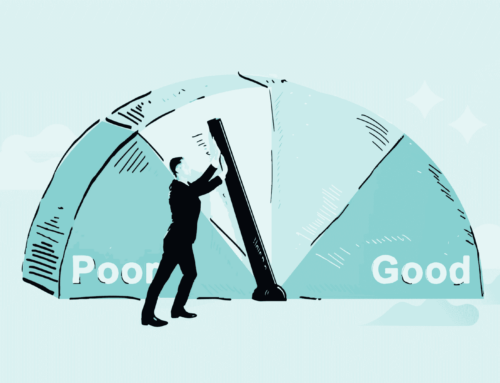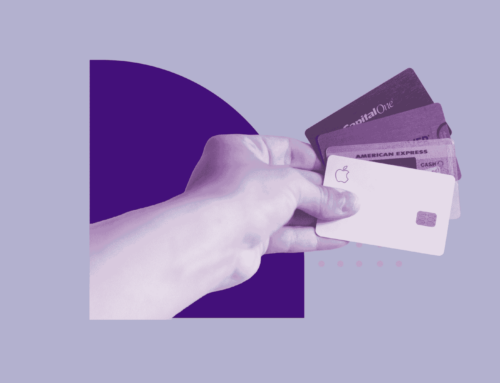A credit score is a three-digit number ranging from 300 to 900. It gives your potential lenders and banks an idea of how financially reliable you are, allowing them to decide whether you’re a risk they’re willing to take on.
In Canada, your potential dream employer may check your credit score before offering you a job, your future landlord may perform a credit check, and if you want to rent a car for a weekend out of town, a credit score check may be a requirement. We recently conducted a personal finance sentiment survey and discovered that 69% of respondents have active loans. With a high amount of our Canadian customer’s obtaining a loan, we would believe that credit health and wellness should be a big priority to get the best rates.
Despite there being many rumours and myths surrounding being your credit scores, we can all agree they’re essential. Your credit score is one of the deciding factors on whether you gain approval for many financial products – think mortgages, car loans, lines of credit or personal loans. Depending on your score, your financial options may vary. But what makes a good credit score in Canada? How do we get a good credit score? Let’s learn more.
What Are Credit Score Ranges in Canada?
In Canada, your credit score may vary depending on where you check it. They vary due to the scoring models, credit data and algorithms that each credit score agency uses. These scores all have the same goal: to predict a consumer’s likelihood to pay their bills. Because of this, it was discovered among many Canadian’s that their credit score was inconsistent across free credit score software and comparing to credit bureaus such as TransUnion & Equifax. So, depending on where your credit score may slightly differ. But regardless of where you check, every credit score agency will use the following guidelines:
- 300-629: This range is considered a bad credit score, and being in this range will make it difficult to obtain financial products, low-interest rates and more.
- 630-689: If you’re in this range, your credit score is considered fair, but improvement is still needed.
- 690-719: You have a Good credit score. Keep up the good work. You have a variety of credit choices to choose from due to your financial habits.
- 719-900: You have an Excellent credit score. Congratulations!
What Is The Average Credit Score in Canada?
According to TransUnion, one of Canada’s major credit reporting agencies, the average credit score in Canada is currently 650. Whereas a credit score of 650 is considered fair, it’s nowhere near excellent. To be approved for most financial products, your credit should at least be 620. But even if you’re approved, you may still be paying high-interest and other fees, which makes having a lower credit score expensive.
Let’s dig a little deeper. Based on a study conducted by Borrowell; Loans Canada compiled a list of average credit scores by province, mentioning a significant city in each. Check it out:
Ontario
- Toronto – 679
- Mississauga – 671
- Ottawa – 663
- Brampton – 646
- Hamilton – 629
Newfoundland and Labrador
- John’s – 664
Alberta
- Calgary – 650
- Edmonton – 625
Nunavut
- Iqaluit – 644
- Saskatchewan
- Regina – 642
Manitoba
- Winnipeg – 638
Nova Scotia
- Halifax – 638
- Northwest Territories
- Yellowknife – 637
Prince Edward Island
- Charlottetown – 636
- New Brunswick
- Fredericton – 628
Yukon
- Whitehorse – 619
British Columbia
- Vancouver – 687
- Victoria – 679
What Is A Good Credit Score in Canada?
With the average credit score in Canada varying depending on the city and province, we see a lot of Canadians fall between the 600 to 700 credit score range. Regardless of this, it’s an age-old question we get daily: What is a good credit score? We know that an excellent credit score is 700 to 900, but it’s hard to figure out precisely what you need to do to get this perfect score.
Lenders generally see anyone with credit scores 660 and up as acceptable or lower-risk borrowers. Those with credit scores below 660 may be less likely to qualify for better loan terms. Those with lower scores that fall into the “poor” credit range (generally below 629) are more likely to have difficulty getting credit or qualifying for better loan terms.
How To Get A Good Credit Score in Canada?
Monitor Your Payment History
Your payment history is one of the most critical factors for your credit score. It’s used to calculate 35% of your credit score. If you had bad debt in the past and continued to miss payments, this will impact your current credit score. Make sure you keep up to date with all your bills to create a new payment history to ensure your lender will consider you financially reliable.
Pay Your Bills On Time
The past is the past. But it’s now time to continue with good habits. It might seem tempting to skip a bill on a month where you’re considerably short on cash, but your credit score won’t like you for it. Make sure your direct debits are set-up for the day (or the day after) you’re paid, to ensure no payments bounce back.
Keep Your Credit Utilization Low
Don’t exceed your credit limit. Credit utilization makes up for 30% of your credit score, and a higher balance compared to your limit may impact your credit score.
Check Your Credit Reports Regularly
You can obtain a free credit report yearly from TransUnion or Equifax, which allows you to ensure your credit is reported correctly. A recent study confirmed that 79% of credit data contains errors, which could be working against you. Make sure you request your credit report and it’s accuracy.
Use a Credit Score Boosting Technology
We’re lucky to live in a world where we have access to so many opportunities online. We have the easiness of searching for answers to many of our frequently asked questions at the click of a button. We have numerous ways to keep in touch with family and friends around the world. We’re also lucky to be able to look after our financial health online, and that includes your credit score.
Score-Up is our financial technology solution that will help you boost your credit score in as little as 30-45 days. Through our industry-leading proprietary technology, you can create a credit score target based on your financial plans and credit history. Our software then analyzes your credit report to develop a fast and clear path to increase your credit score. You can follow our real-time recommendations to make a positive impact on your credit score, giving you confidence for future financial events, all within your desired budget. To find out more about how it works, check out Score-Up here.
About Marble Financial Inc. (CSE: MRBL; OTCQB: MRBLF). We are a group of forward-thinking financial technology experts that fully understand the benefits and drawbacks of credit in Canada. Marble helps Canadians improve their credit to gain access to prime lending. Through our industry-leading proprietary technology solutions: Fast- Track, Score-Up, and Credit-Meds. Since 2016, Marble is proud to have empowered thousands of Canadians to a positive financial future. We continue to establish ourselves as leaders in financial wellness.






